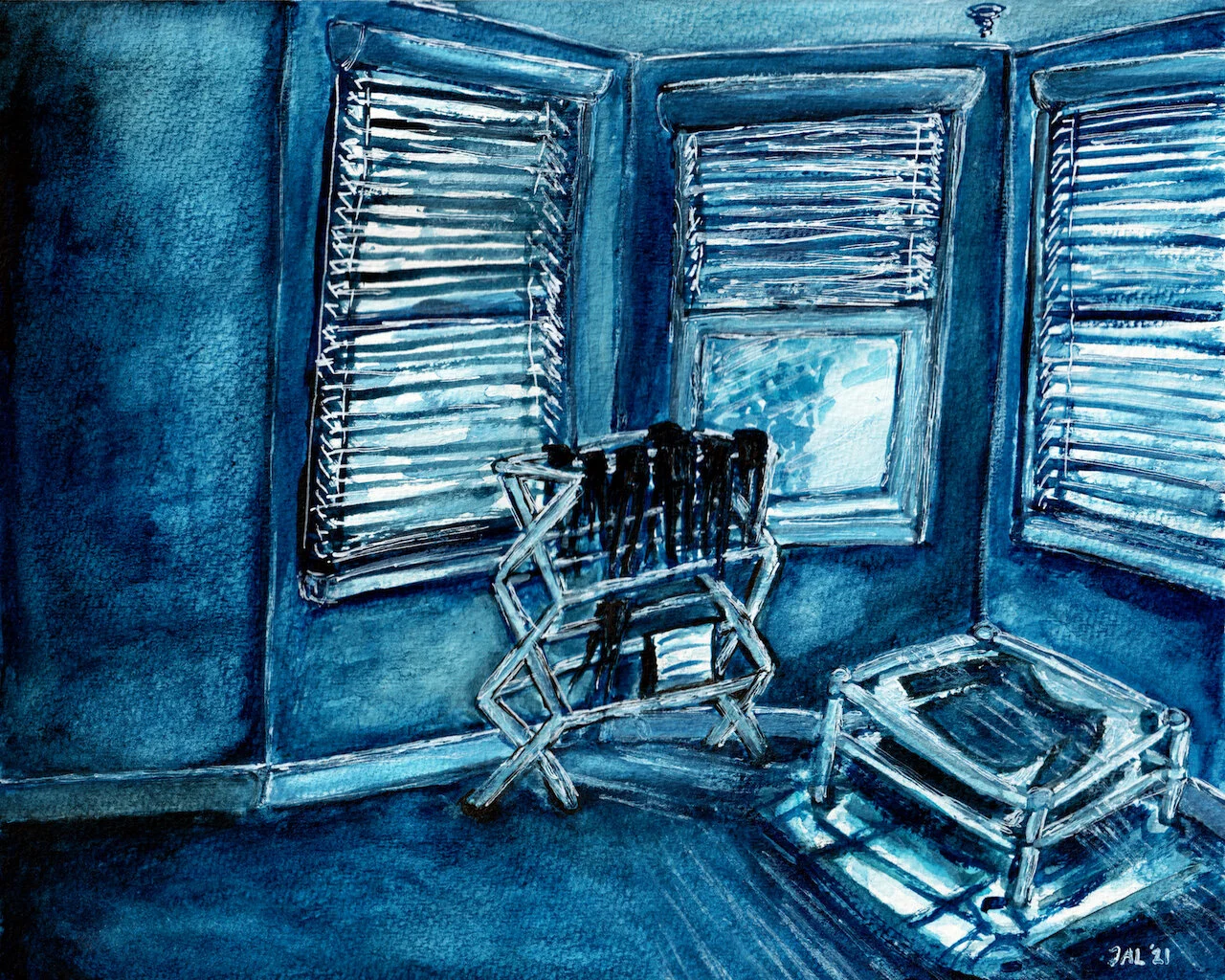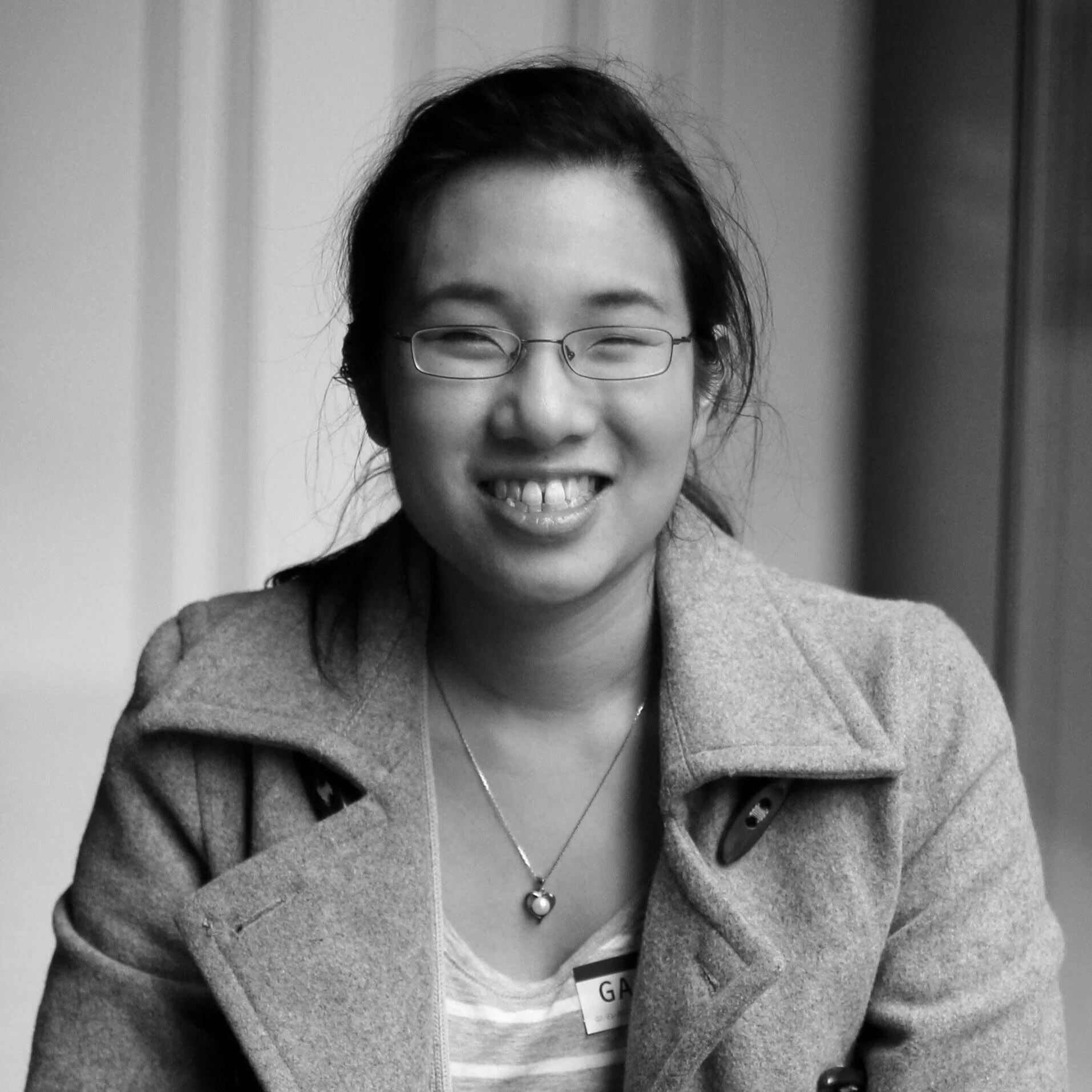Hanging the Masks
Iris A. Law
They emerge from the washer drum
like a colony of train-wrecked spiders—
long legs twisted into fist-sized knots,
limp bodies ballooning into the gaps.
Grudgingly, you set yourself to undoing.
Finger over finger. Poplin loops loosen
their cinch on raveling twill, flannel slips free
from the awkward pinch of elastic jaws.
Your mother, over the phone, recommends an iron.
Nothing that a little starch and steam can’t fix.
Like the customer who greeted her with a naked face.
Or the one making jokes about laundrymen (still).
Who is this? You demand, remembering
your grandfather, the textile chemist, butt
of that age-old gaffe, but it’s a small town.
She won’t say who. All you can do
is knead a crooked nose wire back
into its topstitched groove. You have none
of your mother’s steel, the way she can seal
a story with a crease like a knife. You grip
wet cotton, then pull—till seam remembers
shape, snaps flat to the safety of its folds.
Evening advances across the white bars.
Mom, please make it home.
Artist’s Statement
The pandemic has, in many ways, felt like a monochrome study in interiority: hours and days spent becoming intimate with every nuance of light and shade, every crack and crevice within the walls of my home—the exact corner where my chair catches on the fringe of the ragged blue carpet, the way the sounds of a video game and the oily scent of the cod I fried last night travel straight up the corridor of the stairs and stagnate in the landing. Or the way the light falls in stripes over the drying laundry—a task I have never perfected to my mother’s ability but for which I have my own, new ritual. In the pandemic, laundry has become a task that has given me some perception (however illogical) of control. I imagine the detergent busting up the protein coats of viruses, take morbid delight in the force that it takes to snap a wet, crumpled mask back into shape. I talk to my mother on the phone while I fold and hang and tug and haul and scrub and swish and load. I am thousands of miles away and cannot protect her from anything—from exposure, from the violence against elders that I see in the news, from the microaggressions she faces as an Asian American in a public-facing job. We worry for one another. Mom has always said that ironing helps her feel better about the world: even if all is chaos around her, she can at least smooth the wrinkles from her sheets, her children’s clothes, and now, her masks—of which she starches and irons every pleat. I am not so precise, but now, at nearly thirty-six, I understand a bit more what she has meant all these years. I hang up my masks in the spot where I know the sun’s UV rays will hit most intensely—the better to disinfect. I hang up the phone and say a small prayer. I know, on the other end, my mother is doing the same.
Couronne for Quarantine
I.
The world shuts its windows and doors
on a Tuesday. Storefronts roll down
steel eyelids, blink out in turn. Inside,
we are all still dreaming. Memory of marshes,
brackish with vegetal stink, spoonbills that lap
in the shallows, faint lines of salt like lace. Time
shakes out the lines of its fingers, watches
them soften, tentacles hardening to thin glass bars.
In the alley, a gang of crows scuffles. Storm drains
gurgle, heavy with late-season mud. And still,
the bricks and beams keep watch. Inhale, exhale,
iambic as breathing. Quiet collects in corners.
The days turn damp and sticky footed.
A lizard runs up the garden wall.
II.
A lizard runs up the garden wall. We Tetris
the furniture, jigsaw forgotten cartons
of eggs. Hedges of books spring up
from hardwood parallels. We thread cables
around all the legs, serpentine faults
that scissor across the house. This, here,
is yours; that, mine. Longitudinal shadows
steal in with the early light. Squint at the fritzing camera,
polish its glassy black eye. Our audio segments,
stacks into squares. We shut the blinds, but the sun
still leaks. I cup my hands into half-heart shapes.
A test. The signal scatters. A screen sprouts
in place of my husband’s head and neck.
Purple lights blink out inside his chest.
III.
Purple lights blink out inside his chest.
My father shuts the plastic shade, descends
from memory into anxious dreams. His mother,
struggling to swallow. The cancer burrowing inside,
distending her abdomen; the soft, gray mottle
of her skin. In his boyhood city, doctors are locked in
with the dying. Their children wait on the sidewalk,
waving their crayoned signs. In quarantine, here,
he’s his own kind of ghost. He keeps time
by the hours between his wife’s calls, worries
about the teacher who asked if his kid had SARS.
On the table, a stiff, paper sleeve of photographs.
The shine on his mother’s casket. So many flowers.
The blooms overflowing, spilling around her face.
IV.
The blooms overflowing, spilling around her face,
a woman and her child stop on the sidewalk below
my window. Everything is flowering, the hills flush
with fists of bright poppies. California explodes
in profusions of apricot; tangerine blooms unfurl
like afternoon ghosts. Pale yellow pollen films
the windshields of cars. The air stiffens, crackles
inside my asthmatic lungs. I wheeze and swell.
I itch at the slightest touch. From inside, I watch
this woman bend before the child, offer the names
of the flowers with outstretched palms. Rose, azalea,
oleander, apple blossoms, cactus pear, she whispers.
Their bodies flit beneath the canopy. Now woman. Now
soft-shaded stipple. Now child. Now dappled white.
V.
Soft-shaded stipple. Now child. Now dappled white.
Masked figures float in and out of my father’s hospital room.
The night nurse, perhaps. A name he cannot pin
to its face. His wife’s voice buried somewhere beneath
the machines’ low drone. Cold air wraps his pinned arms.
The tox hisses out. He wishes for a pen, an envelope,
a napkin. Something to write. The bright yellow notebook
his family microwaved and smuggled against advice.
He’s lost track of the numbers, his ballpoint columns
of dosages and A1C counts, control fleeing his grip
like the gulls that scatter when the nurse taps the window.
All those horrible birds, his colleague had said of the gowns.
They’d reminded him of his mother’s death. Their faceless bodies
frozen in flight. It was the birds he could not abide.
VI.
Frozen in flight—it was the birds he could not abide.
Not the geese who’d flattened the grass in the yard,
nor the jays who’d pulped every last pear on the tree.
He remembers how he’d found them squabbling
over the carcasses. He’d scuttled them off with a broom.
You eat like a bird, he’s been told all his life, and yet,
like the birds, he’s survived till now, burr scalped, belly
fat with fluid, flesh leathered down to the bones
that the poison scrapes clear. He thinks he remembers
what it is to be touched by plain skin. Not hands
sheathed in nitrile, the heavy, sweet plastic stink
as they swab him clean. The drip pushes out.
He feels the juice warbling around the line’s beak,
its feathers inside the vein, like ice growing in.
VII.
Its feathers inside the vein, like ice growing in.
Easter Vigil now, and I fry pancakes to a lacy crisp,
snip old cotton shirts into squares to stitch masks.
Tenebrae smoke still clogs my ears. The gray beat after
the candle, curl of soot hanging above the still-warm wick.
How familiar, this silk-sewn quiet—the day after death,
to move in a dream. How the body still wakes and walks,
hands bend to scrub the hospital germs from a shirt,
fingers pick tissues from the pockets of your jeans.
Daylight tightens. The drone of the microwave
thickens to wax. Something still soft in the waiting—
the way, when you were eighteen, your father shut himself
away. He showed you the funeral photos, face turned aside.
The world shut its windows and doors.
Notes toward Hope
December 2020
The texture of it, fine as sieved smoke,
its scent, thick with bee bodies. How no body
truly vanishes but transforms after death,
each cell shuffling into the bricks of some
other creature’s mold. The candle’s cotton wick
still flush with prehistoric carbon, whole ear or eye
of a dinosaur excavating itself as the new braid
blackens and burns. Eons of scaled and feathered
things rise to the ceiling of my living room,
their atoms infusing the purple shadows,
and I think I could write another poem
about saving what is lost, my parents
scraping orange piths after dinner, collecting
the sugar-boiled peels in glass jars. How
we make our own sweetness from refuse.
But light begets light. And tonight, I’m thinking
of my student, the gold threads she hung
in the cherry boughs in her poem, the yolk
of the image still curled, sleeping beneath,
waiting for some signal—for long light,
the touch of some old sun—to set it aflame.
about the writer
Iris A. Law is a poet, editor, and educator living in the San Francisco Bay area. A Kundiman fellow and two-time Pushcart nominee whose poems have appeared in journals such as wildness, Waxwing, Dusie, and The Collagist (now The Rupture), she is also founding coeditor of the online literary magazine Lantern Review. Her chapbook, Periodicity, was published by Finishing Line Press in 2013.


